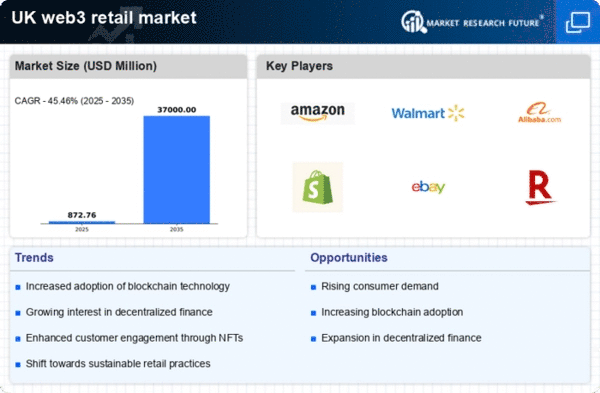Increased Consumer Trust
The web3 in-retail market is witnessing a notable shift towards enhanced consumer trust. This shift is primarily driven by the transparency and security offered by blockchain technology. As consumers become more aware of data privacy issues, the decentralized nature of web3 solutions appears to resonate with their desire for control over personal information. In the UK, a survey indicated that approximately 70% of consumers express a preference for brands that utilize blockchain for transparency in transactions. This growing trust is likely to encourage more consumers to engage with retailers adopting web3 technologies, thereby fostering a more robust market environment.
Enhanced Loyalty Programs
The web3 in-retail market is evolving due to the introduction of innovative loyalty programs that leverage blockchain technology. These programs allow for the creation of decentralized loyalty points that can be easily transferred or traded among consumers. In the UK, retailers implementing such programs have observed a 20% increase in customer retention rates. This shift towards more flexible and rewarding loyalty systems appears to enhance customer engagement and satisfaction. As consumers seek more value from their shopping experiences, the adoption of blockchain-based loyalty programs may become a key differentiator for retailers aiming to thrive in a competitive landscape.
Rise of Digital Ownership
The concept of digital ownership is gaining traction within the web3 in-retail market, as consumers increasingly seek to own their digital assets. Non-fungible tokens (NFTs) are becoming a popular means for retailers to offer unique products and experiences. In the UK, the NFT market has seen a surge, with sales reaching £1.5 billion in 2025. This trend suggests that retailers who embrace digital ownership through NFTs may attract a new demographic of consumers, enhancing brand loyalty and engagement. The potential for unique digital collectibles could redefine customer interactions and purchasing behaviors in the retail sector.
Sustainability Initiatives
Sustainability is becoming increasingly important in the web3 in-retail market, as consumers demand environmentally responsible practices from brands. The use of blockchain technology can enhance supply chain transparency, allowing consumers to verify the sustainability of products. In the UK, a report indicated that 65% of consumers are willing to pay more for products that are sustainably sourced. Retailers leveraging web3 solutions to demonstrate their commitment to sustainability may not only meet consumer expectations but also differentiate themselves in a competitive market. This focus on sustainability could drive growth and innovation within the retail sector.
Integration of Smart Contracts
Smart contracts are emerging as a pivotal element in the web3 in-retail market, streamlining transactions and reducing operational costs. These self-executing contracts facilitate automated processes, ensuring that agreements are fulfilled without the need for intermediaries. In the UK, retailers adopting smart contracts have reported a reduction in transaction times by up to 30%, which could significantly enhance customer satisfaction. This efficiency not only lowers costs but also fosters a more agile retail environment, allowing businesses to respond swiftly to market demands. The integration of smart contracts may thus play a crucial role in shaping the future of retail operations.
















